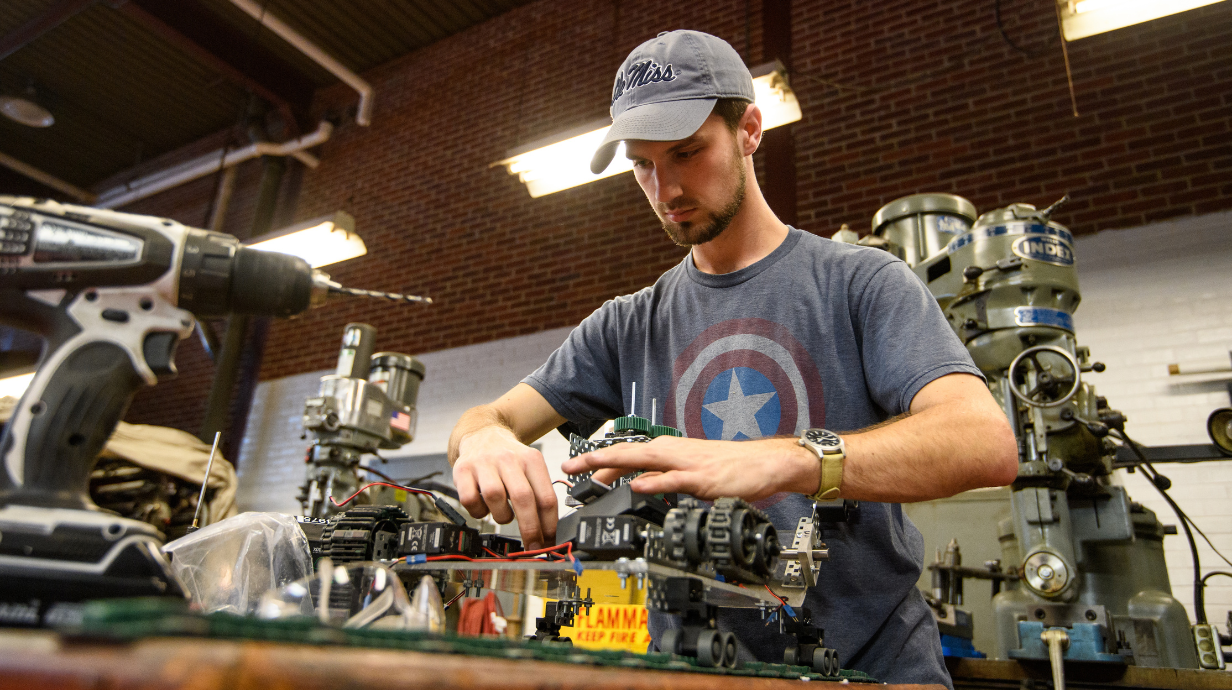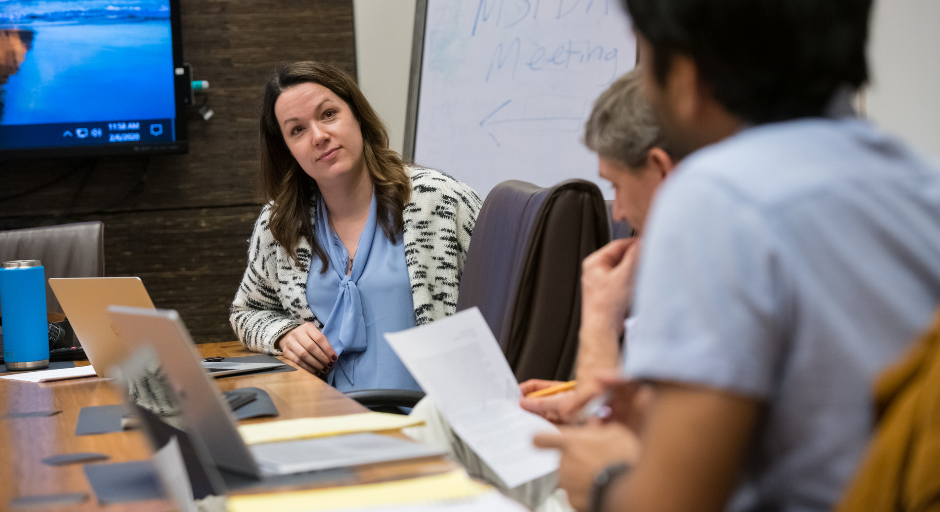For questions about the program intent or process, you may email resdev@olemiss.edu.
Resources for Researchers
ORED can help connect you with resources you can leverage to drive your research forward. Whether you need access to shared instrumentation, expertise, services, or funding opportunities, let us help you find what you’re looking for at the university or beyond.

Connecting researchers to the resources that matter
Your research has the power to drive discovery, solve problems, and create lasting impact—and we're here to help you make it happen.
At ORED, we’re dedicated to advancing your research by providing the services, connections, and expertise you need at every stage of your journey. From securing funding to sharing your findings, our goal is to help your research thrive.
Take your research to new heights
The Fly with the VCRED program will fly you and other UM researchers on the university jet to D.C or other cities to meet with program officers or conduct scholarly site visits. The Vice Chancellor for Research and Economic Development or their designee will accompany travelers on the trip.
Program Officer Visits: Conduct scheduled meetings with program officers at funding agencies to pitch your project ideas and discuss their alignment with current or future funding opportunities.
Scholarly Site Visits: Conduct scholarly research at museums, libraries, archives, or other sites where an advanced appointment is not required.
Full-time employees with long-term appointments in research and scholarly roles who have identified candidate funding opportunity targets or host site can apply at any time to be considered for seats on future flights when they are scheduled periodically throughout the year.
Next Flight Date: There are no flights scheduled at this time.
To apply as a Program Officer Visitor, you must:
- Be a full-time UM employee with a long-term appointment with a research or scholarly role.
- Have attended ORED’s one-hour “Talking to Program Officers” training or completed the online version.
- Have identified the specific funding program and program officer you wish to visit to discuss your concept.
- Have had some interaction with this program officer in the past (phone call, email exchange, feedback on a past proposal, etc.).
- Have drafted a short concept paper summarizing a program or project idea that you wish to seek funding for (see the Concept Paper Note below).
- Have discussed this concept with your chair and associate dean for research (ADR) or dean and received indication that they are supportive if your trip.
- Have an up-to-date researcher faculty profile that highlights your areas of expertise and research interests.
Concept Paper Note: The concept paper is a one- or two-page summary of your proposal idea, using language and/or format customized for the audience. For example, an NIH concept paper make take the form of an NIH-style Specific Aims Statement, whereas an NSF concept paper may take the form of a NSF Project Summary.
If in doubt about what format to use, consult your chair, or your ADR, or ORED Research Development. The draft concept paper does not have to be completely fleshed out, finalized, or polished at the time you submit your application, and ORED Research Development can help you refine it by reviewing and providing feedback on drafts after you apply.
See also: Program Officer Outreach Guidance (a toolkit prepared by Hanover Research for its clients).
Full-time employees with long-term appointments in research and scholarly roles who wish to conduct a scholarly site visit to a museum, library, archive, or other site where an advanced reservation is not required can apply for standby status on a scheduled or to-be-scheduled flight to the D.C. area. If there are still open seats two weeks prior to a scheduled flight, we will seek to fill those seats with individuals on the standby list.
As applications are received, Research Development will vet them for eligibility, completeness, and confirm supervisory endorsement, and offer assistance in editing/polishing the concept paper. Then, as flights are scheduled, we will reach out to vetted applicants in turn and offer them the opportunity to schedule a visit with their program officer on the appointed date. As these appointments are confirmed, seats will be assigned until the flight is full.
Collaborate, write and publish together with the RED Writing Group
The RED Writing Group program brings together a small cohort of 5–8 UM faculty and staff for a semester-long scientific writing course. Participants will collaborate on a unified research topic using a secondary dataset, culminating in peer-reviewed publications within a year. These publications aim to establish a history of collaboration, enhancing the competitiveness of joint grant proposals.
For the 2025 cohort, common data will be the dataset from the All of Us research project. The group will be led by John C. Higginbotham, Vice Chancellor for Research and Economic Development.

RED Writing Group application process
The program is for UM faculty and staff whose roles may include publishing peer-reviewed articles.
Additionally, applicants must:
- have attended ORED’s one-hour “Writing for Peer Reviewed Scientific Publication” training or completed the online version,
- demonstrate an in interest in collaborating with faculty (from other departments) with whom they have never collaborated before,
- demonstrate an interest to conduct and publish collaborative research that makes use of the chosen secondary data set, and
- commit to meet at the designated time each month in the designated semester for instruction and discussion. We will schedule the meetings around the teaching schedules of the selected cohort members.
The application window for the next semester’s writing group has not opened yet; when it does, we will add a link to the application form here. The application will ask for:
- General info about the applicant (contact info, department, appointment title, etc.)
- A general statement of research and collaboration interest
- A general statement of interest in, and ability to make use of, the chosen secondary data set.
- A biosketch. (NIH format or NSF format is preferred. If you have questions about preparing your biosketch, consult your unit’s assigned ORED pre-award research administrator.)
- Potential grant funding opportunities for your research
- Your teaching schedule for the upcoming semester
After vetting your application for completeness and verifying with your chair and Dean or ADR that they support your application, we will select the group we think will have the best potential to collaborate and publish together, considering the following:
- New collaboration potential (we are especially interested in new collaborations among individuals with promising publication records)
- Potential to make use of the chosen secondary dataset
- Strength of schedule (the cohort all need to be available at the same time every week with Dr. H.)
- Preference will be given to assistant professors who meet the criteria above; however, other faculty and also staff are welcome to apply, and will be considered for inclusion of their are slots remaining.
Applicants might be asked to attend in-person discussions if we think they will help us select a team with strong promise to publish together and compete for grants together.
We aim to have the cohort selection finalized and communicated before the winter break.
Resources for every stage of your research
-
Researcher's Toolkit
Access a growing list of resources to help you navigate the various stages of your research—find information on training, award management, hiring research staff, working with collaborators, submitting progress reports, and more.
Explore the Toolkit -
External Funding Opportunities
Explore funding opportunities from federal, state, and private sources to support your research goals.
Find Opportunities -
Internal Funding Opportunities
Discover ORED’s internal funding programs designed to support innovative research and professional growth for faculty and students.
Explore Internal Funding -
Shared Facilities
Leverage cutting-edge instrumentation and shared facilities across campus to advance your research and streamline your work.
View Facilities -
Assessment & Evaluation
Get the support needed to assess your project outcomes and demonstrate the value of your research to funders and stakeholders.
Get Guidance
